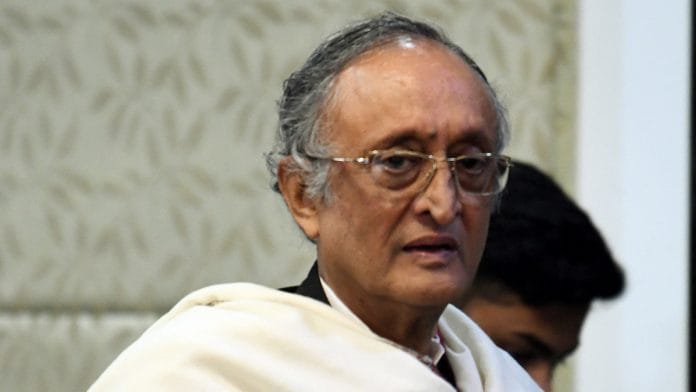New Delhi: West Bengal Sunday rejected the Narendra Modi government’s two proposals for borrowing to meet the states’ goods and services tax (GST) shortfall.
West Bengal Finance Minister Amit Mitra termed the proposals a “Hobson’s choice”, and said it will adversely impact states’ developmental funds if they have to borrow.
Other opposition-ruled states like Kerala, Punjab and Chhattisgarh have also opposed the proposal in the last couple of days, reiterating their demand that the central government should borrow to compensate the states.
The central government had assured the states of full compensation for any losses arising due to a transition to GST for a period of five years, assuming an annual 14 per cent growth rate in revenues beginning July 2017. However, the economic slowdown beginning last year and now the impact of Covid-19 and the lockdown have led to cess collections — levied on ‘sin’ goods like tobacco and aerated drinks or luxury goods — falling, due to which the government is unable to meet the GST compensation requirements.
Also read: BJP & non-BJP states join hands to take on Modi govt over unpaid GST dues
The options
The Narendra Modi government estimates that the GST shortfall to states will be around Rs 3 lakh crore in 2020-21, but only around Rs 65,000 crore will be met through cess collections, leaving an unmet compensation gap of Rs 2.35 lakh.
It has thus given states two options: Borrow Rs 97,000 crore (revenue shortfall arising on account of GST implementation and not taking into account the Covid-19 impact) or borrow the entire Rs 2.35 lakh crore.
If states borrow Rs 97,000 crore, the entire principal and interest repayment of the debt will be met through cess collections in later years. In addition, states are being given relaxations to borrow an additional 0.5 percentage points under the Fiscal Responsibility and Budget Management (FRBM) Act.
However, if the states opt for the second choice and borrow the higher amount, only the principal amount will be repaid from the cess, and the states will have to bear the interest burden.
At a virtual press conference, Mitra said about the choices: “The first option does not take into account the shortfall on account of the Covid pandemic. And in the second choice, even if we want to borrow, we won’t be able to borrow due to the FRBM Act. Interest payment burden will also fall on the states.”
Deficit monetisation
Mitra also dismissed the central government’s argument that if it borrows, which will have macroeconomic repercussions.
“The central government can go in for deficit monetisation, whereas, if the states borrow, their macroeconomic condition will be impacted,” he said, adding many states are in a severe financial crisis.
The Bengal minister also questioned the central government’s decision to not circulate the agenda of the meeting held Thursday ahead of schedule, as well as its decision to not circulate the opinion of the Attorney General of India on the matter of compensation.
He pointed out that 15 states, including many BJP-ruled ones, said the Centre should be the one borrowing to address the shortfall in GST compensation fund.
Going ahead, Mitra said the states will get together before the next GST Council meeting to discuss their next course of action, reiterating that it is the Centre’s responsibility to compensate the states.
Also read: Centre-state row over GST dues is no one’s fault, but underlines need to reform govt bond market







I have a doubt:
Do we have a “Modi Govt” or a democratically elected Government of India? Why do certain section of people call it Modi Govt. He is only a PM.